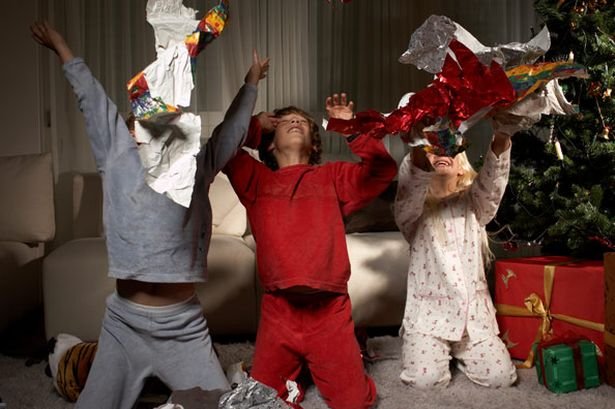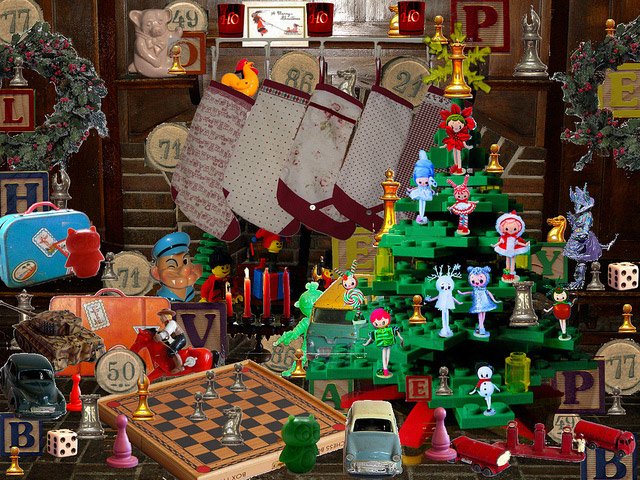Christmas Harmony with Game Theory
Winter gatherings in the warmth of family and heated homes can ignite a spark of Christmas in many, while for others the close-quarter reunion is time to get at each other's throats.
To get people to be more harmonious during the holidays, we can turn to game theory. Game theory can apply in various aspects of our lives, not limited to broadcasting rights of sports channels, organ donation, or any situation to try to determine a win-win solution for all parties by recognizing the alternative is a lose-lose outcome.

Game theory applies in so many ways in our lives, that knowing how game theory functions can help us prevent familial conflict and instill a temporary harmony during the holiday season. If you doubt it, just think back of the Cold War and realize how game theory prevented a global annihilation. Mutually assured destruction (MAD) was an understanding brought about through game theory. If you think your family problems are bigger then global nuclear annihilation, okay... then I guess you have some serious problems. :P

Battle for Hosting
In situations where there are only two contenders for where the Christmas celebrations will be hosted that year, it is very easy to get people in the family to vote between one location or the other.
But in cases where there are three or more choices contending for Christmas patronage, it's best to rank your preferences for each choice, from one for most important, and so on. When everyone's preferences are tabulated, the lowest score wins as the most desired. This is known as a Borda count.

Battle for Bringing Food
In some cases there is one big meal prepared on the day or the evening of celebration. While in other cases, the meal is a collective cooperative preparation where many people bring food to share.
Some dishes that people bring may be very good, while other dishes may not be so good, but no one says anything because they don't want to upset or hurt someone. Fear is a problem, but that's another issue.
In game theory, how you present a situation or option can affect someone accepting it, and this is known as framing. In a situation where people are told or expected to behave in a social context, they are more altruistic and cooperative. Whereas a situation that is presented as a business interaction will produce behavior that is more selfish to lack consideration for others. And this is the point of game theory, to understand how other people might respond to something being done or being said.
For example, if you want to bring change about, attach the change you're trying to bring with a change that already happened. For example, if the location has changed this year, then also add a change of dishes that people will bring and the suggestion will be more accepted.

Battle for Dessert
Not only can there be a fight for who brings what for food, but there can also be battles for who gets to eat the last of certain foods, whether it's the last bit of carrots, bread or a fine piece of desert.
A strategy to deal with this comes from game theory, called "I Cut, You Pick".
Instead of relying on one person to make an honest division and pick who gets what themselves, a fairer way is to have one person cut, and the other person pick a piece. This ensures that the person cutting will do their absolute best to maximize a fair distribution.
Motivating someone to divide something up in a fair and equitable manner will ensure that both sides end up satisfied. This methodology can be taken outside of food to anything where you have an argument over who gets what, as long as the item in question can be divided.

Battle for Calm
Are the kids going crazy running after each other before dinner? Do they not listen when told to calm down? Do they ignore the threats of punishment in favor of their chaotic enjoyment?
Then maybe the consequences aren't grave enough, or the simpler reason is that the children know your threats are empty and that you won't follow through on them.
For example, some parents threaten to "turn the car around"or "leave" the Christmas gathering if the children don't settle down by saying "if you don't stop we're leaving!"
But that doesn't work on the kids, because they are smart and they know that their mother does not want to leave, so she is making an empty threat and they have no reason to stop doing what they are doing. There are no consequences in this case. But if you change things around to something that you will actually do, like for instance make the kids do the dishes, then that is a threat with real consequences that they will have to face.

Battle for Cleaning
There might be one or more family members that don't participate in a cleanup routine of the night's festivities, whether it is from the meal or from opening gifts.
Telling these family members that they should help might not work for you. This is because people tend to pay more attention to empirical expectations that they can see around them from what others do, than from normative expectations of what others tell them they should do.
An experiment that demonstrates this is where people are expected to donate. If someone simply tells you other people think you should donate, it's only a normative expectation of what other people think you should do. However, if someone tells you most people donate, that is telling you what other people do as opposed to what other people think you should do. Then you have a comparative assessment of seeing how your behavior differs from their behavior, and it shows you how you can do what others are doing. Seeing other people doing it, rather than them simply tell you to do it without seeing them doing it as well.
For the unhelpful family member, if someone cleans up around them then they are more likely to notice cleaning being done and feel obliged to pitch in and do their own fair share of the work rather than getting other people to clean up around them.

Battle for Gaming
If family members are arguing over what to do as an activity after eating, or after gifts are opened, such as watching a movie or playing a game, then you bring out the auction system.
This ties in to the previous one, because you can assign chores like cleaning, or doing the dishes as a cost for winning. Whoever makes the best offer by doing the most work, wins and picks what will be done in terms of free or fun time.
Auctions are useful for resolving many disputes in life, from who gets something in an inheritance to which radio stations get which radio-frequency.

Battle for Sharing
And of course there is always the eternal problem of getting kids to share.
One example is with a box of chocolates that can be used to teach children to use game theory. Ask one person to divide the chocolates amongst the two of them, but if the other person doesn't agree with how the division was done, they call in the third-party parent to make the decision, and they will also take a portion of the chocolates for themselves as a consequence of the party's inability to share and divide the chocolates on their own.
This applies in the real world in businesses and international negotiations. If a trade is unfair enough for everyone, then everyone loses. The alternative is much more desirable even if there is some loss, it's not as great of a loss.
People will take a loss if they think they are getting gypped. We will often gladly take a loss if it means putting someone in their place when they are acting unfairly.
Closing Remarks
So the next time Christmas becomes more a of a pain than a pleasure, don't forget these game theory models and solutions. After all, Christmas aligns perfectly with game theory: "the study of mathematical models of conflict and cooperation between intelligent rational decision-makers."
How fun is that!? Using math to resolve conflicts and cooperate at Christmas so we can be rational decision makers? I would be surprised if there is any model more representative of Christmas than that!
Be a nerd, be cool by keeping your cool, and be a game theorist! Your family will thank you for it. The world will thank you for it. Let's get rid of this psychopathic need for nuclear bombs and really bring a chance for peace on earth! Game theory was popularized during the wold war nuclear threat, so I thought it fitting to tie that back into a Christmas "spirit" for world peace.
Mad World - Gary Jules
What a MAD world indeed!
Merry Christmas!

Thank you for your time and attention! I appreciate the knowledge reaching more people. Take care. Peace.
References:
- How to win at christmas
- How to apply Game Theory to buying your Christmas presents
- The secret of secret Santa
If you appreciate and value the content, please consider:
@krnel
2016-12-18, 8:25am

Great post, have you read `the Evolution of Cooperation' by Robert Axelrod. You will love it if your into game theory. One of the best books I ever read, I would recommend it.
Thanks for the feedback and recommendation.
This post has been ranked within the top 50 most undervalued posts in the second half of Dec 18. We estimate that this post is undervalued by $10.21 as compared to a scenario in which every voter had an equal say.
See the full rankings and details in The Daily Tribune: Dec 18 - Part II. You can also read about some of our methodology, data analysis and technical details in our initial post.
If you are the author and would prefer not to receive these comments, simply reply "Stop" to this comment.